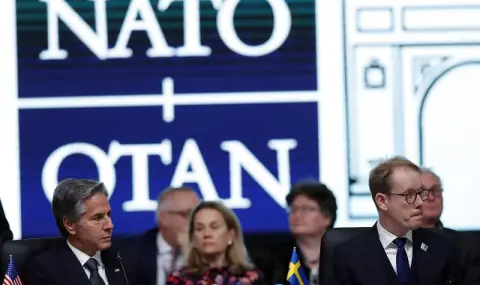Attacks by American representatives against European NATO countries have shaken the Atlantic Alliance to its core, which, however, finds it very difficult to imagine a future without the US in its ranks.
Under the verbal attacks of US President Donald Trump and his team, the North Atlantic Treaty Organization - figuratively speaking, an "old lady over 75 years old" - knows that it must change. However, the aggressiveness of the new US administration is being experienced as trauma, explains a diplomat.
But will this change in NATO happen with or without the US? The question is causing unrest in the corridors of the Alliance headquarters in Brussels.
"We know where we are going - less US and more Europe", says another diplomat from the Alliance. But many questions remain unanswered. In two months, Donald Trump has taken on Canada, which he says he wants to become the 51st state of the United States. He has also taken on Denmark, whose territory Greenland he claims.
And several American representatives, including Vice President J.D. Vance, have made no secret of their disdain for the Europeans, whom they consider users, illegal immigrants in an Alliance in which they do not pay their dues.
"Since January 20, the date of Donald Trump's return to the White House, optimism has been waning," says a diplomat. "The US has not yet made any concrete decisions, but one could say that every day brings a new blow to the foundations of the Alliance," he added.
According to Camille Grand, former NATO deputy secretary general and researcher at the European Council on Foreign Relations, three scenarios are possible. First, that of an organized transition - the Americans disengage after negotiations that give the Europeans time to prepare. "This allows uncertainty to be avoided," he assured Agence France-Presse.
The second scenario is of an unorganized transition - the US remains a member of NATO, including in terms of nuclear deterrence, but it disengages with regard to conventional forces, as mentioned by US Secretary of Defense Pete Hegseth.
The analyst adds that this disengagement is now taking place with threats and chaotic statements. This is somewhat the dominant scenario today.
Finally, there is another scenario, and it is a nightmare for a number of allies, especially for Central and Eastern Europe - there will not be a mandatory official withdrawal of the US from NATO, but there will be a situation in which the US will not be interested in defending the European continent.
Trump has already threatened those countries that do not fulfill their commitments regarding defense spending in Europe that he will not defend them and has demanded that Europeans, as well as Canadians, allocate at least 5 percent of their GDP for the defense of the Alliance.
For some countries, such as Italy and Spain, which currently spend less than 2 percent of their GDP, the bar has been set high. But everyone knows they have to announce something at the NATO summit in The Hague in June, says a diplomat from the alliance.
Secretary-General Mark Rutte has mentioned spending of 3.5-3.7 percent of GDP to allies, says another diplomat. "It will be difficult, but it is a question of national spending priorities," he says.
But no one yet knows whether these percentages will be enough for Trump.
In anticipation of that, many in Brussels and other European capitals are wondering whether we will reach a "post-US" period. "We always knew there would come a point when America would pull back in some way and Europe would have to do more," said Jamie Shea, a former NATO spokesman and expert at the London think tank Chatham House.
And the timetable is very tight. The Europeans have five years to regain their deterrence in the face of the Russian threat, says Camille Grand. These projections are based on estimates of how long it will take several intelligence services for Russia to rebuild its military and be able to threaten a NATO country, he adds.
According to the expert, the Europeans are capable of restoring their deterrence, although it will take significant investment to offset the American contribution in terms of defense, satellites or logistics. "There is no reason to believe that 500 million Europeans will not be able to dissuade 140 million Russians," says Camille Grand.
But some countries doubt this. "The United States remains necessary for credible dissuasion," says a European NATO diplomat.
Translated from French: Gabriela Golemanska, BTA
